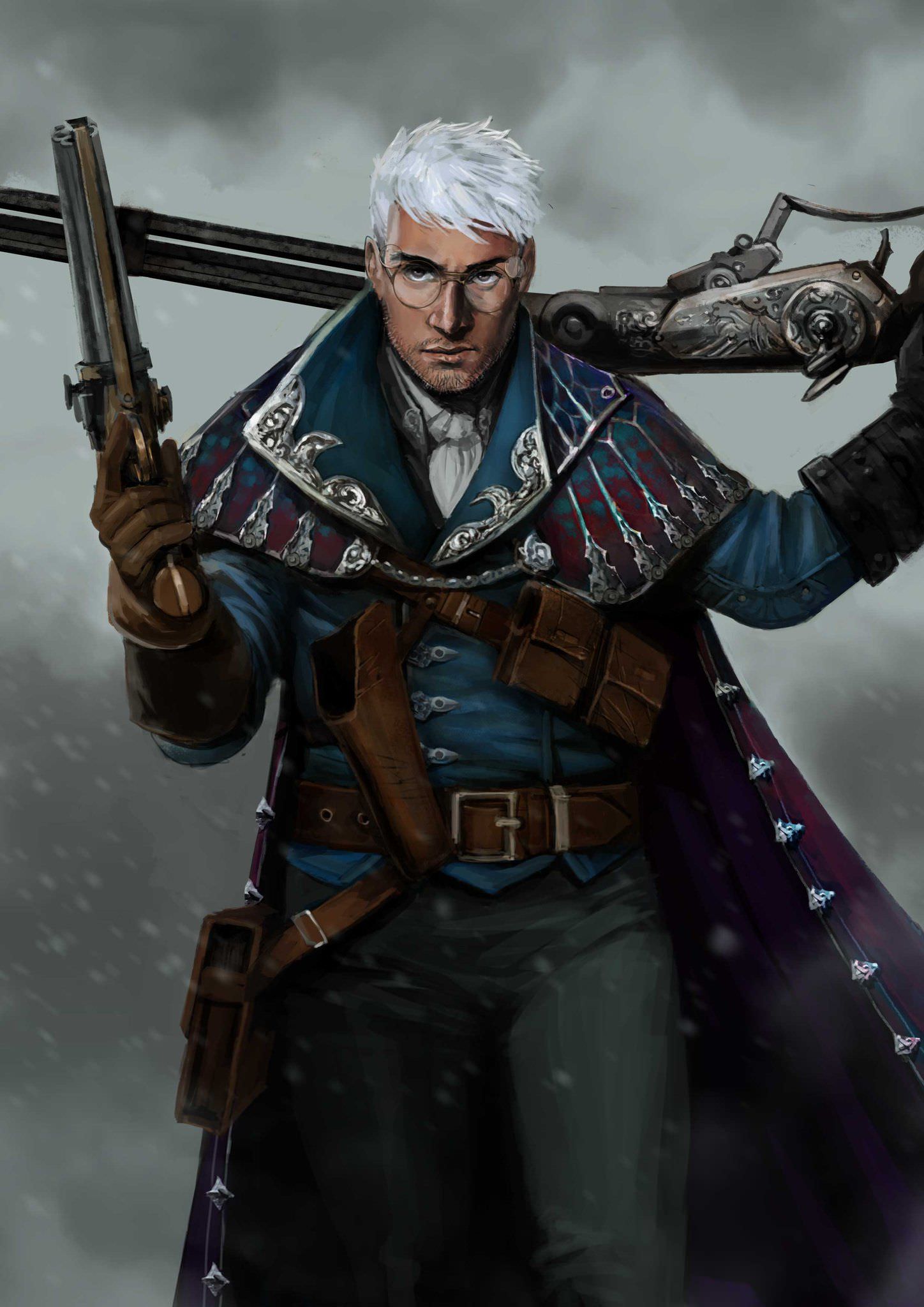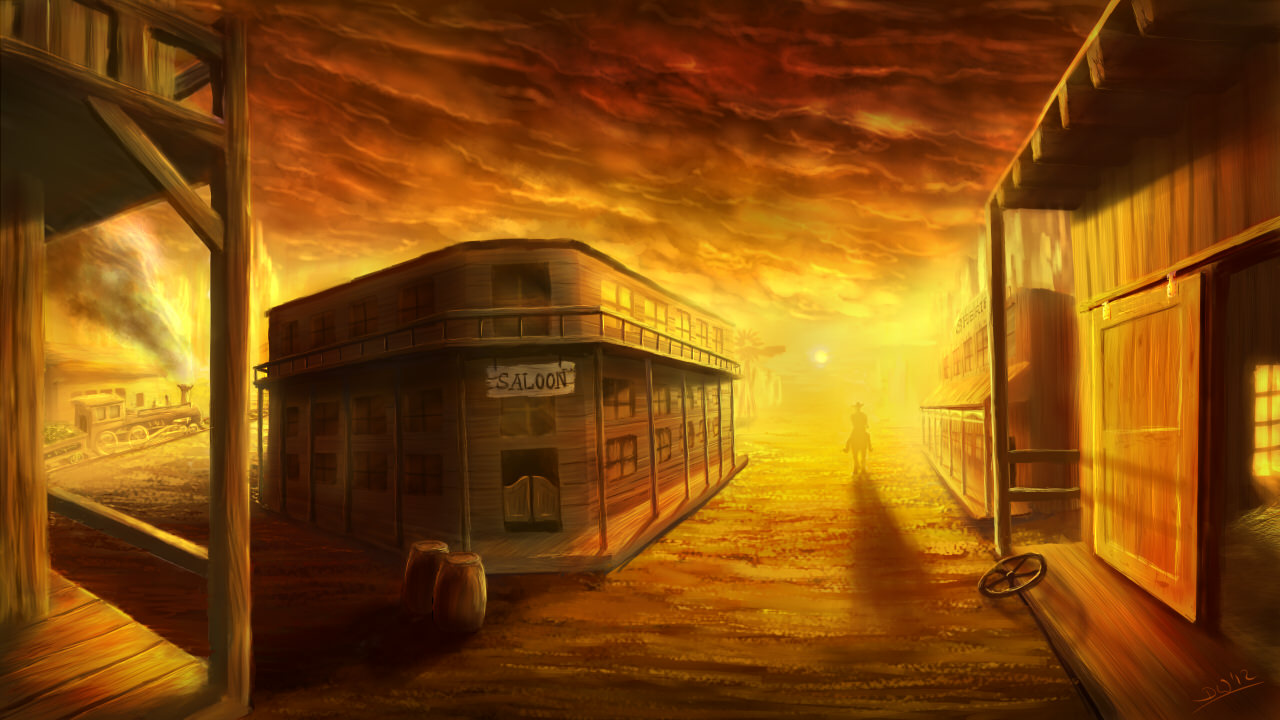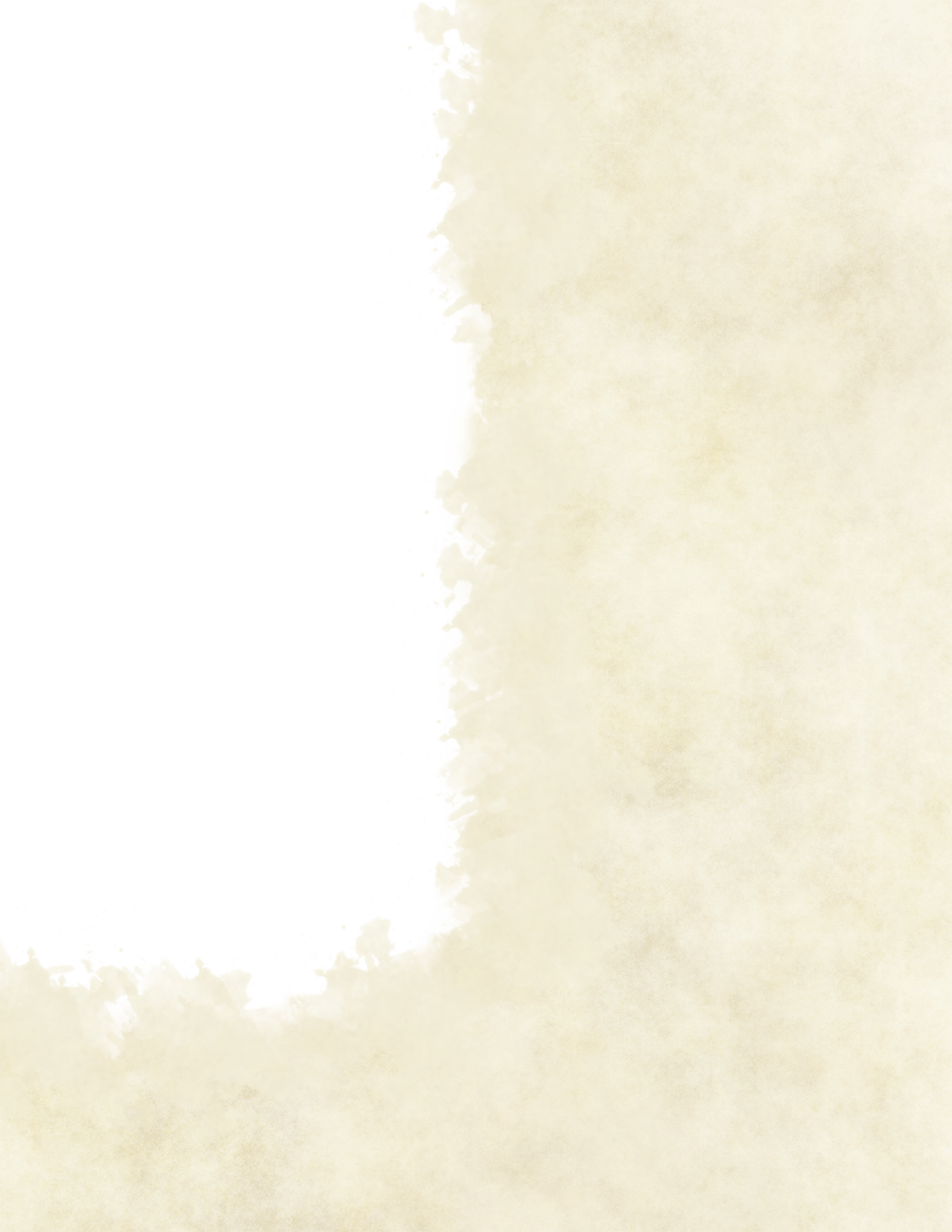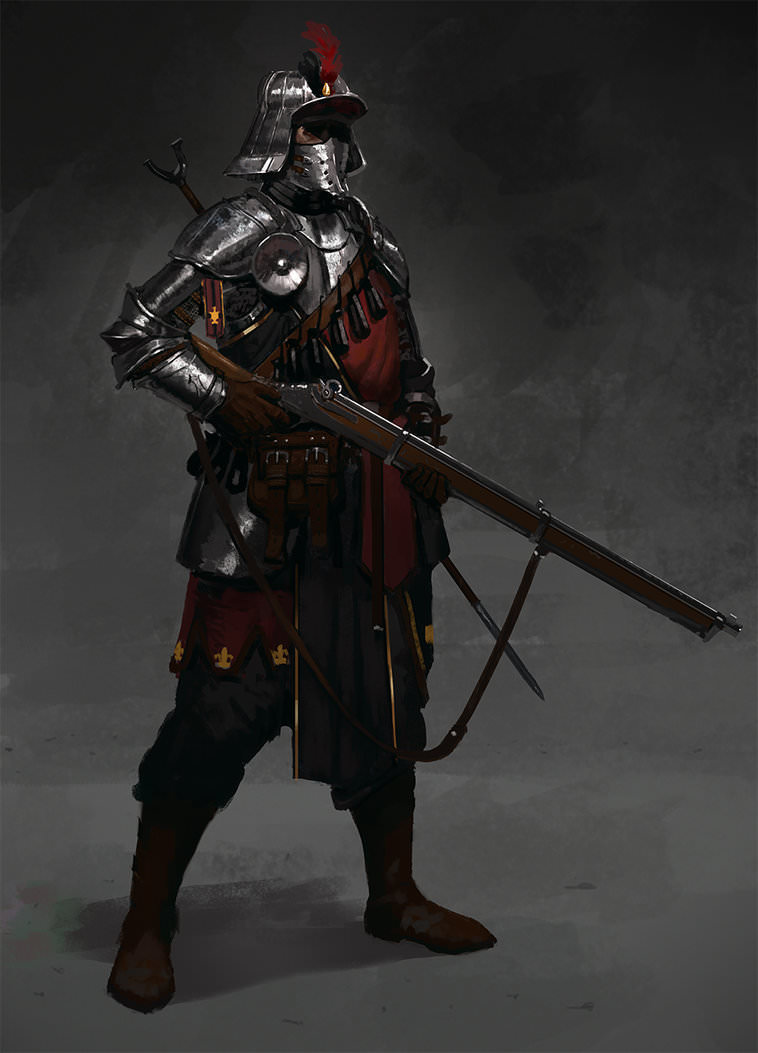

Gunslinger
The human man hid behind the rock, looking down upon his friends fighting the goblin hoard bellow, he took out his hand cannon and aimed at the centre of the bridge the goblins were coming from, focused his magic into his gun, and fired. A small fiery red bead flew down and landed on the rickety wooden bridge, suddenly exploding, destroying the bridge completing, and sending any goblins that weren’t incinerated, screaming into the abyss bellow.
The tiefling woman kicked open the doors to the saloon as she let out a maniacal laughter alongside an onslaught of lead from her twin pistols. Within 10 seconds all the denizens of the watering hole were bleeding out on the ground; except for her human contact who sat at the bar with an impressed smirk on his face.
The gnome braces himself for the kickback of his shoulder cannon as he pulls the trigger. A cacophonous blast echoes across the deck of the ship as he is thrown off his feet, smacking his head against the main mask.
Warriors of a New Age
Most warriors and combat specialists spend their years perfecting the classic arts of swordplay, archery, or polearm tactics. Whether duellist or infantry, martial weapons were seemingly perfected long ago, and the true challenge is to master them.
However, some minds couldn’t stop with the innovation of the crossbow. Experimentation with alchemical components and rare metals have unlocked the secrets of controlled explosive force. The few who survive these trials of ingenuity may become the first to wield, and in some cases create, the first firearms.
Echoing Chaos
Wherever a gunslinger wanders, chaos is sure to follow with a hail of lead and spatters of blood.
In the right hands a firearm is a machine of limitless death, and gunslingers certainly have the right hands. Many would say that firearms will lead only to new wars within the world, but many others say that they will protect them from incursions. But in reality, whoever has the most boom sticks and people to shoot them wins.
Creating a Gunslinger
When creating a gunslinger, keep the following things in mind: Where did you learn to use the tools of your ‘trade’? Where you in an army, gifted with superior technology? Were you taught by an old slinger the ways of the gun?
Where did you get your guns? Did you steal them? Did your lieutenant let you keep yours, did you pry it from the corpse of another man, perhaps that same lieutenant? Perhaps you even built them yourself, using the supplies of a university, or maybe even scrap parts.
What brings a gunslinger to an adventuring party? Are you a mercenary looking for more chance at coin and death? Are you a young man out for revenge on those who killed his family?
Quick Build
You can make a gunslinger quickly by following these suggestions. First, make Dexterity your highest ability score, followed by Constitution. You could instead choose Intelligence as your second highest if you wish to take the spellslinger gunslinger archetype. Second, choose the criminal or sailor backgrounds.
Class Features
As an gunslinger, you gain the following class features.
Hit Points
- Hit Dice: 1d8 per gunslinger level
- Hit Points at 1st Level: 8 + your Constitution modifier
- Hit Points at Higher Levels: 1d8 (or 5) + your Constitution modifier per gunslinger level after 1st
Proficiencies
- Armour: Light armour
- Weapons: Firearms
- Tools: Gunsmith’s Kit
- Saving Throws: Dexterity, Charisma
- Skills: Choose two from Acrobatics, Athletics, Deception, Medicine, Perception, Sleight of Hand or Stealth
Equipment
You start with the following equipment, in addition to the equipment granted by your background:
- (a) a pistol, or (b) a rifle and a bipod
- a pistol and two holsters
- an explorer’s pack
- leather armour, an ammo bandolier, 20 bullets and a gunsmith’s kit
The Gunslinger
| Level | Proficiency Bonus | ⠀Grit⠀ | Features |
|---|---|---|---|
| 1st | +2 | 2 | Grit |
| 2nd | +2 | 2 | Take Cover, Speed Draw |
| 3rd | +2 | 3 | Gunslinger Trail, Lucky Stars |
| 4th | +2 | 3 | Ability Score Improvement |
| 5th | +3 | 4 | Extra Attack |
| 6th | +3 | 4 | Gunslinger Trail Feature |
| 7th | +3 | 5 | Bullseye |
| 8th | +3 | 5 | Ability Score Improvement |
| 9th | +4 | 6 | Evasion, Speed Draw Improvement |
| 10th | +4 | 6 | Gunslinger Trail Feature |
| 11th | +4 | 7 | Dead Shot |
| 12th | +4 | 7 | Ability Score Improvement |
| 13th | +5 | 8 | Lead Rain |
| 14th | +5 | 8 | Gunslinger Trail Feature |
| 15th | +5 | 9 | Cheat Death |
| 16th | +5 | 9 | Ability Score Improvement |
| 17th | +6 | 10 | Improved Lucky Stars |
| 18th | +6 | 10 | Hawkeye |
| 19th | +6 | 10 | Ability Score Improvement |
| 20th | +6 | 10 | True Grit |



Grit
Beginning at 1st level, you make your mark upon the world with daring deeds. Some gunslingers claim they belong to a mystical way of the gun, but it’s more likely that the volatile nature of firearms simply prunes the unlucky and careless from their ranks. Whatever the reason, all gunslingers have Grit Points. Your gunslinger level determines the number of points you have, as shown on the Grit column of the gunslinger table.
You can spend these points to fuel various grit features. You start knowing three such features: Deadeye, Gunslinger Dodge, and Quick Clear. You learn more grit features as you gain levels in this class.
When you spend a grit point, it is lost. When you complete a short or long rest, your grit is reset to the number shown on the Grit column of the gunslinger table. You cannot have more grit points than an amount equal to the number shown in the Grit column of the gunslinger table + your proficiency bonus.
Additionally, you gain 1 grit point when either of the following events occur:
- You score a critical hit on an attack roll made with a firearm.
- You reduce a creature to 0 hit points with damage from a firearm or gunslinger class feature.
Some of your grit features require your target to make a saving throw to resist its effects. The saving throw DC is calculated as follows:
- Grit save DC = 8 + your proficiency bonus + your Dexterity modifier
Deadeye
When you make a ranged weapon attack, you may expend 1 grit point to gain advantage on your roll.
Gambling Dodge
When you would be hit by an attack roll, you may use your rection to expend 1 grit point, forcing the attacker to reroll. The attacker must use the new roll.
Quick Clear
You may expend 1 grit point at any time you could take a reaction to reload or unjam one firearm.
Take Cover
At 2nd level, you can dynamically adapt even the simplest cover into excellent protection. You treat half-cover has three-quarter’s cover, and three-quarter’s cover as full cover.
Speed Draw
Also at 2nd level, your trigger finger has a mind of its own, reacting to danger before you can even see it. You had advantage on initiative rolls.
Additionally, when you reach 9th level, you cannot be surprised whilst you’re conscious.
Gunslinger Trail
At 3rd level, you choose an archetype that specializes and focuses your skill with guns. Choose the trail of your choice, all detailed at the end of the class description. The archetype you choose grants you features at 3rd level and again at 6th, 10th, and 14th level.
Lucky Stars
Also at 3rd level, you know just how to count your lucky stars each time you pull the trigger. Choose a number between 2 and 19. The chosen number is your lucky number. Whenever you make an attack roll, ability check, or saving throw, if the result of your dice is equal to your lucky number, you may treat the result as if you had rolled a 20 on the dice.
If your lucky number would overlap with your firearm’s misfire, increase that firearm’s misfire threshold by 1 whilst you use it. When you reach 18th level, you can choose one more lucky number.
Ability Score Improvement
When you reach 4th level and again at 8th, 12th, 16th, and 19th level, you can increase one ability score of your choice by 2, or you can increase two ability scores of your choice by 1. As normal, you can’t increase an ability score above 20 using this feature.
Extra Attack
Beginning at 5th level, you can attack twice, instead of once, whenever you take the Attack action on your turn.
Bullseye
When you reach 7th level, you can target the weak points of your opponents with your attacks. When you make an attack roll with a firearm, you may expend 1 grit point, choosing a body part from the list below. On a hit, the target suffers an additional effect based on the body part chosen.
| Body Part | Effect on Hit |
|---|---|
| Arm | The target must succeed on a Strength saving throw or drop whatever is it holding in that hand. |
| Head | The target must succeed on a Constitution saving throw or become blinded until the end of your next turn. |
| Leg/Wing | The target must succeed on a Strength saving throw or fall prone. |
| Torso | At the beginning of each of the target’s turns for the next minute it loses 1d6 hit points from bleeding. A successful Intelligence (Medicine) check made as an action against your grit save DC cures all bleeding wounds on a creature within 5 feet. |
Evasion
Starting at 9th level, you can nimbly dodge out of the way of certain area effects, such as a red dragon’s fiery breath or an ice storm spell. When you are subjected to an effect that allows you to make a Dexterity saving throw to take only half damage, you instead take no damage if you succeed on the saving throw, and only take half damage if you fail.
Dead Shot
Beginning at 11th level, you have the ability to maximise your precision, training your aim into one perfect shot. When you would take the Attack action on your turn with a firearm, you may expend 2 grit points to combine your attacks into one against a single target. Make each attack roll as normal against the chosen target, expending only one round of ammunition. If at least one of the attack rolls hits the target, it is treated as if they all hit. If at least one of the attack rolls is a critical hit, all attack rolls are treated as a critical hit. Your gun only jams if all rolls fail to meet the gun’s misfire threshold.
Lead Rain
When you reach 13th level, your unmatched prowess has allowed you to master the art of shooting. When you score a critical hit with a firearm. You can make an additional attack roll with a firearm immediately afterwards.
If you scored this critical hit as a part of your Dead Shot feature, this extra attack is included as if it were a part of that same Dead Shot attack roll, though does not gain the benefit of the critical hit itself.
Cheat Death
Starting at 15th level you gain the ability to evade certain death through sheer force of will. When would be reduced to 0 hit points, you can spend 3 grit points to drop to 1 hit point instead.
Hawkeye
When you reach 18th level, you unparalleled aim allows you to never miss an easy shot. Whenever you roll a 9 or lower on an attack with a firearm, unless the result would fail to exceed your weapon’s misfire threshold, you may treat that result as a 10.
True Grit
By the time you reach 20th level, your skill and tenacity is unparalleled. When you roll initiative and have less than 4 grit points, you regain grit until you have 4 points.
Additionally, when you score a critical hit on a creature, after you have rolled damage you may expend up to 9 grit points. If the target’s current hit points is equal to or less than 100, you blow out its vital organs, killing the target.
Gunslinger Trails
Different gunslingers specialise in different styles of shooting, and whilst they can all pick up a pistol and hit a target, some hold specialisations or preferences that require an extra step beyond simply pulling the trigger.
Trail of the Musketeer
Musketeers are known for their unparalleled aim and accuracy, able to hit enemies from hundreds of feet away with ease and efficiency.
Steady Breath
Beginning when you choose this trail at 3rd level, you gain the ability to make unerringly deadly shots. When you make an attack roll with a firearm on your turn, you may spend 1 grit point and your bonus action, drawing a breath of focus. On a hit, roll the attack’s damage dice one additional time.
The number of grit points you may expend on this feature increases as you gain gunslinger levels, increasing by 1 at 6th, 10th and 14th level.
For each additional grit point you spend, you roll the attack’s damage dice one additional time.
Improved Deadeye
Starting at 6th level, your deadeye allows you to enter a state of unparalleled efficiency. When you use your deadeye feature, you gain the following benefits:
- You ignore the penalties of attacking at long range until the end of the turn.
- Your misfire threshold is reduced by 1.
- You cannot suffer disadvantage on attack rolls against creatures you can see until the end of the turn.
Second Nature
When you reach 10th level, the care of your arms is second nature to you. At any point on your turn, you may reload one firearm, no action required.
Additionally, you gain immunity to the blinded and deafened conditions.
Thread the Needle
At 14th level, you gain the ability to line up your shots with an uncanny level of precision. As an action on your turn, you may spend 3 grit points to attack all enemies in a 5-foot wide line the length of the maximum range of your firearm.
Make a single attack against all creatures in the area, checking the result against the closest target’s first. The first time the attack fails to hit a creature in the line, the attack instantly misses all other creatures behind it in the line.
Trail of the Pistolero
Known for their quick reflexes and even quicker trigger-finger, the aim of a pistolero is pure instinct.
Fists Full of Fire
Beginning when you choose this trail at 3rd level, you are far more efficient with your firearms . When you take the Attack action on your turn, you may make one attack with a firearm in your off-hand as a bonus action.
Additionally, whilst you wield two light firearms, you can combine your off-hand attack with an attack made as a part of your Attack action. If you do, make one attack roll for both attacks, which may target different creatures, or the same creature.

Fan the Hammers
When you reach 6th level, you can rapidly cycle through the rounds in your guns more effectively. Once per turn, when you make an attack roll with a firearm, you may expend 1 grit point to make an additional attack with that firearm.
Lead Flower
Beginning at 10th level, your rain of gunfire is a perfect blossom of lead bullets. When you take the Attack action on your turn, you may expend 3 grit points. If you do, you gain advantage on all attack rolls made until the end of your turn. However, all attacks you make this turn must target different creatures. If a creature has multiple sections of its body with different pools of hit points, such as a roper’s tentacles, you may target those sections as if they were different creatures.
Bullet Storm
When you reach 14th level, there’s seemingly no limit on your instinctual nature. You can use your fan the hammers feature more than once per turn. Additionally, when you use your lead flower feature, you can make one additional attack with a firearm that turn as a part of the Attack action.
Trail of the Spellslinger
Combining the versatility of magic with the raw power of firearms, spellslingers make themselves a force to beckoned with as they blow away the competition with their arcane arms.
Spellcasting
When you select this gunslinger archetype at 3rd level, you gain the ability to cast spells. See chapter 10 of the Player’s Handbook for the general rules of spellcasting and chapter 11 of the Player’s Handbook for the wizard spell list.
Cantrips. You learn three cantrips of your choice from the wizard spell list. You learn an additional wizard cantrip of your choice at 10th level.
Spell Slots. The Spellslinger Spellcasting table shows how many spell slots you have to cast your spells of 1st level and higher. To cast one of these spells, you must expend a slot of the spell’s level or higher. You regain all expended spell slots when you finish a long rest.
For example, if you know the 1st-level spell burning hands and have a 1st-level and a 2nd-level spell slot available, you can cast burning hands using either slot.
Spells Known of 1st level and Higher. You know three 1st-level wizard spells of your choice, two of which you must choose from the evocation and illusion spells on the wizard spell list.
The Spells Known column of the Spellslinger Spellcasting table shows when you learn more wizard spells of 1st level or higher. Each of these spells must be an evocation or illusion spell of your choice, and must be of a level for which you have spell slots. For instance, when you reach 7th level in this class, you can learn one new spell of 1st level or 2nd level. The spells you learn at 8th, 14th, and 20th level can come from any school of magic.
Spellslinger Spellcasting
| Level | Cantrips Known |
Spells Known |
1st | 2nd | 3rd | 4th |
|---|---|---|---|---|---|---|
| 3rd | 3 | 3 | 2 | – | – | – |
| 4th | 3 | 4 | 3 | – | – | – |
| 5th | 3 | 4 | 3 | – | – | – |
| 6th | 3 | 4 | 3 | – | – | – |
| 7th | 3 | 5 | 4 | 2 | – | – |
| 8th | 3 | 6 | 4 | 2 | – | – |
| 9th | 3 | 6 | 4 | 2 | – | – |
| 10th | 4 | 7 | 4 | 3 | – | – |
| 11th | 4 | 8 | 4 | 3 | – | – |
| 12th | 4 | 8 | 4 | 3 | – | – |
| 13th | 4 | 9 | 4 | 3 | 2 | – |
| 14th | 4 | 10 | 4 | 3 | 2 | – |
| 15th | 4 | 10 | 4 | 3 | 2 | – |
| 16th | 4 | 11 | 4 | 3 | 2 | – |
| 17th | 4 | 11 | 4 | 3 | 3 | – |
| 18th | 4 | 11 | 4 | 3 | 3 | – |
| 19th | 4 | 12 | 4 | 3 | 3 | 1 |
| 20th | 4 | 13 | 4 | 3 | 3 | 1 |
Whenever you gain a level in this class, you can replace one of the wizard spells you know with another spell of your choice from the wizard spell list. The new spell must be of a level for which you have spell slots, and it must be an evocation or illusion spell, unless you’re replacing the spell you gained at 8th, 14th, or 20th level.
Spellcasting Ability. Intelligence is your spellcasting ability for your spellslinger spells, since you learn your spells through force of personality. You use your Intelligence whenever a spell refers to your spellcasting ability. In addition, you use your Intelligence modifier when setting the saving throw DC for a spellslinger spell you cast and when making an attack roll with one.
- Spell save DC = 8 + your proficiency bonus + your Intelligence modifier
- Spell attack modifier = your proficiency bonus + your Intelligence modifier
Gun Bond
At 3rd level, you learn a ritual that creates a magical bond between yourself and one firearm. You perform the ritual over the course of 1 hour, which can be done during a short rest. The firearm must be within your reach throughout the ritual, at the conclusion of which you touch the firearm and forge the bond.
Once you have bonded a firearm to yourself, you can’t be disarmed of that firearm unless you are incapacitated. If it is on the same plane of existence, you can summon that firearm as a bonus action on your turn, causing it to teleport instantly to your hand.
You can have up to two bonded firearms, but can summon only one at a time with your bonus action. If you attempt to bond with a third firearm, you must break the bond with one of the other two.
Arcane Shot
Starting at 6th level, you gain the ability to infuse your firearms attacks with magical power. Once per turn when you make a weapon attack with a firearm, you may expend 2 grit points to augment it with a cantrip you know. If the attack hits, the cantrip is instantly cast, centred on the target, using the same attack roll result as the attack if applicable.
For example, a spellslinger that knows the ray of frost cantrip could use this ability to cause a target hit by the attack to suffer the damage and secondary effects of ray of frost. Alternatively, if the spellslinger augments their attack with the spell clamouring tones, the cantrips effects originate in the target’s space on a hit, prompting a saving throw from all targets within range.
When you reach 10th level, you may expend a spell slot of 1st level or higher as a part of this feature, augmenting your attack with a spell you know of the chosen level.
Magic Bullets
When you reach 10th level, your magical talent is infused into your firearms. You ranged weapon attacks made with firearms are considered magical for the purposes of overcoming resistance and immunity.
Additionally, once per turn, when you hit a creature with a ranged weapon attack made with a firearm, the target takes an additional 1d6 force damage.
Living Lead
When you reach 14th level, your magic is so heavily ingrained in you that it does some of the most menial tasks for you. At the start of each of your turns, each firearm you have on your person becomes fully reloaded.
Additionally, whenever you score a critical hit against a creature, make a second attack against another target within range as the same bullet flies through the original target, seeking a new foe.
Trail of the Street Samurai
No formal training, no luck; only cold, hard talent; the street samurai are masters of their own art. They prefer not to sit at a comfortable distance, safely planting lead between their foe’s eyes. Instead, they get up close and personal, dealing the final blow with either a bullet or a pinpoint strike.
Gunkata
When you choose this trail at 3rd level, you have learned the basic techniques of utilising firearms in close combat. You gain the following benefits:
- You gain proficiency with simple and improvised weapons.
- When you make a ranged weapon attack against creature within 20 feet of you, a hostile creature being within 5 feet of you does not impose disadvantage on your attack roll.
- You can use Dexterity, instead of Strength, for the attack and damage rolls of your improvised weapon attacks and unarmed strikes, and you can roll a d4 in place of their normal damage. This die becomes a d6 when you reach 7th level in this class, and a d8 when you reach 15th level in this class.
- When you take the Attack action with an unarmed strike, improvised weapon, or firearm on your turn, you can make an unarmed strike against the same target as a bonus action this turn.
Bullet Time
By 6th level, your continued training in close-quarters combat has greatly honed your reaction time, allowing you to dodge assaults at the last possible second. When a creature you can see hits you with an attack, you can expend a grit point as a reaction to add your Intelligence modifier (minimum of 1) to your AC against the attack, potentially causing the attack to miss. Additionally, when a creature you can see attempts to grapple you and succeeds, you can use your reaction to add your Intelligence modifier (minimum of 1) to the ability check you made to resist the grapple, potentially causing the creature’s attempt to fail.
Countershot
Starting at 10th level, your reaction time is so perfect that you can return fire even when under direct assault. When you cause an attack to miss or a grapple attempt to fail with your Bullet Time, you can make a weapon attack or unarmed strike as part of the same reaction.
Army of One
At 14th level, your mastery of close combat has honed your battlefield awareness to incredible levels, allowing you to hold your own against large groups of foes. In combat, you get a special reaction that you can take once on each creature’s turn other than your own. You can use this special reaction only to use your bullet time.
Additionally, when you use your bullet time feature, you may expend no grit points. Once you have used bullet time in this way, you cannot do so again until the start of your next turn.
Trail of the Virtuoso
With shooting and showmanship, the virtuoso inspires his allies with flashy sharpshooting, dramatic flourishes, and aim truer than any other.
Trick Shooting
Starting when you begin this trail at 3rd level, your unparalleled aim allows you to inflict greater pain with greater panache. When you make a weapon attack using a firearm, you may spend 1 grit point to begin trick shooting. Whenever you hit a creature with an attack roll made with a firearm whilst trick shooting, you gain trick shot stacks equal to half your proficiency bonus and the target takes additional damage equal to your total number of trick shot stacks.
If you score a critical hit whilst trick shooting, you instead gain trick shot stacks equal to your proficiency bonus.
Your trick shooting ends after one minute, you miss a weapon attack, or you make an attack roll using a weapon that is not a firearm. When you trick shooting ends, you lose all trick shot stacks.
Inspiring Flourish
At 6th level, your precision, accuracy and showmanship in battle excites new resolve in your allies. Once per turn, when you hit a creature with an attack roll using a firearm that you used grit points to augment, one creature you choose within 15 feet of you gains advantage on the next attack roll it makes before the end of your next turn.
Dashing Dodge
Beginning at 10th level, your charisma shines through to distract your enemies when they try to strike you. When you use your gambling dodge grit feature, the target instead has disadvantage on their attack roll. If the attack still hits you, you reduce the damage taken by an amount equal to your Charisma modifier. If the attack misses you, you can move up to half your speed without provoking attacks of opportunity.
Curtain Call
Starting at 14th level, your marksmanship allows you to find weak points in your foes. When you score a critical hit against a creature, you can spend 2 grit points to attempt break its defences. The target must succeed on a Constitution saving throw or take a penalty to its armour class equal to half your Charisma modifier until the end of your next turn. Should you use this feature whilst you have a number of trick shot stacks equal to or greater than your proficiency bonus, the target suffers disadvantage on its saving throw.
Multiclassing
Ability Score Minimum. Dexterity 13
Proficiencies Gained. Leather armour, firearms, gunsmith's kit

Jack Weighill's
Homebrew
Compendium
Hello players and GM Binder devs! You've found the back page of a class from my class compendium. Not all of this work is mine, in fact, most of it isn't! It is simply here for ease of access for the players, and isn't shared elsewhere.
To my memory, the gunslinger was the first class I added to my class list outside of the base 5e classes, and has been a favourite since day one!
Over time the gunslinger has gone through a variety of changes to its abilities, but has remained largely the same mechanically, with the firearms themselves being far more of a pain in the ass than the class itself ever was.